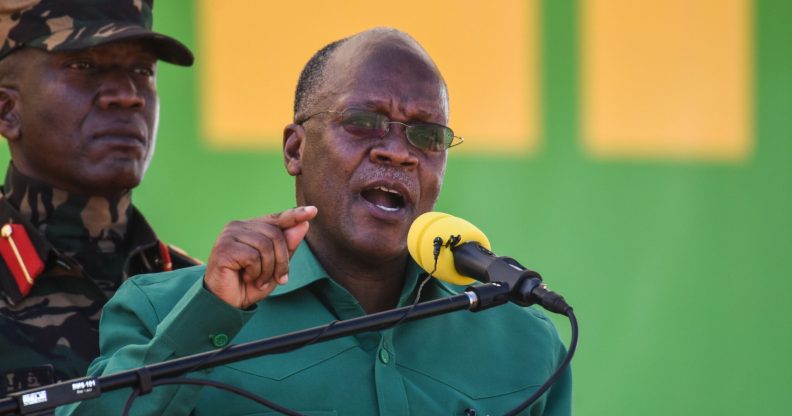Tanzanian president John Magufuli is dead but his cruel, hateful homophobic legacy lives on

Tanzanian president John Magufuli (Ericky Boniphace/AFP/ Getty)
Tanzania’s COVID-denying president John Magufuli, 61, has died amid speculation that he had contracted the disease.
Magufuli’s death was announced on Wednesday (17 March) by the country’s vice-president, Samia Suluhu, who said the president died of heart failure.
A divisive figure, he leaves behind a controversial legacy as one of Africa’s most prominent coronavirus sceptics – and a world leader in homophobia.
When John Magufuli came to power in 2015 homosexuality was a crime punishable by up to 30 years in prison, but he was determined to crack down even further.
In the five years that followed he presided over a regime rife in LGBT+ intimidation and human rights abuses, including deportations, “witch hunts” and forced anal examinations.
Magufuli was outspoken in his hatred for LGBT+ people and flat out refused to decriminalise homosexuality despite increasing pressure from the international community, which he saw as an attack on African values.
His crusade against the Tanzanian LGBT+ community began in earnest in 2016, when his government banned HIV/AIDS outreach projects and closed 40 private health centres that were providing treatment.
He followed this with the shutdown of several US-funded programs that offered HIV testing, condoms, and medical care to the LGBT+ community.
Tanzania currently has one of the highest HIV rates in the world, with around 5 per cent of adults carrying the virus. John Magufuli’s government blamed this solely on gay people, who were accused of “fuelling the spread” among the straight population.
That made it all the easier to escalate his anti-LGBT+ evangelism in 2017, when he scorned foreign aid if it came from those who supported LGBT+ rights.
“Those who teach such things do not like us, brothers. They brought us drugs and homosexual practices that even cows disapprove of,” he declared.

LGBT+ people protest outside the Tanzania High Commission in South Africa in 2018 (Philll Magaoke/AFP/ Getty)
Shortly after this speech all LGBT+ activists and organisations in the country were shut down. Tanzanian activists were threatened with arrest, while foreigners were warned they would be deported so fast “they will not even have the time to unplug their mobile phones from the socket”.
“Those who are interested in homosexuality should go and live in countries that entertain such business,” said home affairs minister Mwigulu Nchemba.
“If there’s any organisation that supports and campaigns for homosexuality it shall be deregistered.”
With the Tanzanian LGBT+ community now isolated from their allies, there were few people left to speak out when dozens of “suspected gays” were taken to hospitals for forced anal examinations.
It’s been conclusively shown that such exams prove nothing and the practice is widely considered to be a human rights violation – yet Tanzania’s deputy health minister gave his full support.
This homophobic rhetoric continued to go unchecked in 2018 as the governor of Dar es Salaam announced the creation of a surveillance squad dedicated to hunting down gay people.
His 17-member team of state officials, police and media figures was created to scour the internet to track down gay people who “trample on the moral values of Tanzanians”, test them for homosexual conduct and jail them for life.
John Magufuli was forced to disavow the governor’s comments amid the international outcry that followed. His administration clarified that this surveillance squad was not government policy, yet offered nothing to temper the homophobic hatred it triggered.
The institutional homophobia continued up until John Magufuli’s death which has drawn mixed reactions in Tanzania. The president’s second term was won in an election marred by violence and allegations of fraud, leaving a bitter taste in many Tanzanians’ mouths.
But it’s certain that he’ll be missed by no one so little as the LGBT+ community, who are now forced to live with the deeply discriminatory legacy he cultivated.

